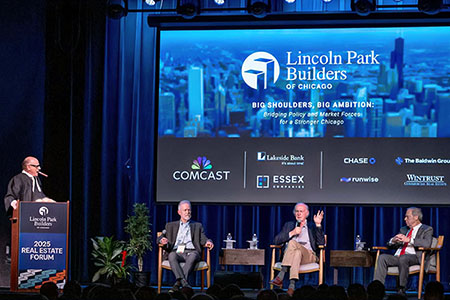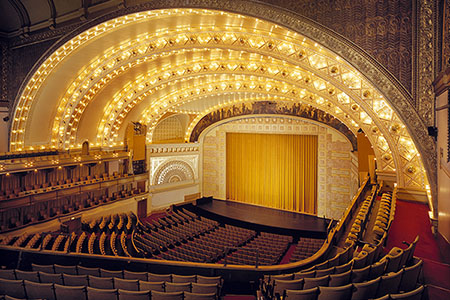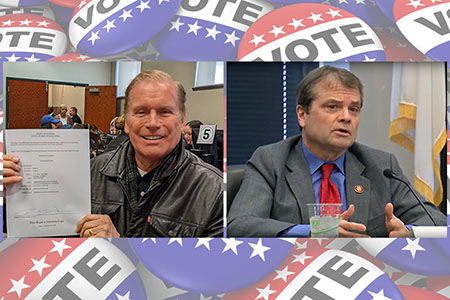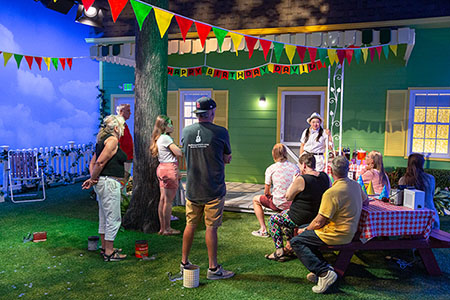
The city says your water usage is 30 times what it is normally and gives you two choices: pay now or pay in installments. An investigation by The Home Front found an unbelievable saga of red tape, waste, and bureaucratic bungling.
(Above) William Dever and Carter Harrison water intake cribs, connected by footbridge, in Lake Michigan off North Avenue Beach. The cribs house water for the City of Chicago. Photo by David B. Gleason. May 16, 2023 – Lake Michigan is seemingly overflowing with God’s gift – fresh rainwater. However, hundreds of North Side Chicago homeowners are drowning in thousands of dollars of water bill debt. Take the sad case of Lincoln Park homeowner Charles Wehland, who recently was hit with a tsunami-sized water bill of $6,913, up from his normal bill of $232. That is a bill for two months of combined water, sewer, and garbage service. The charge was for using a whopping 613,000 gallons of water – more than 30 times his normal usage – for his single-family home.
The City of Chicago Department of Water Management told Wehland he had two choices: pay the bill or set up a payment plan. However, the city did offer to send a worker to check the water meter. If the bill is incorrect, his account would be credited, the city said. “I don’t want 30 months of credit,” Wehland said. “That’s what I would end up getting because they wouldn’t refund my overpayment.” A North Side condominium building saw their water bill jump from a monthly average of about $800 to $10,000, WGN News also reported. The city told the owners that the spike likely was caused by a leak. But no leaks were found, and no plumbing repairs were made. The following month, the bill dropped back to $800. Because leaks don’t repair themselves, the building’s residents suspect it was a meter malfunction. But the city told them to pay up anyway.
For the previous three billing cycles the charges ranged from $419 to $462. So, the bill had doubled. The wise investor knew something was wrong. The water bill for his four-flat in Old Town typically averaged about $165 for a two-month billing cycle, while the bill for an associate’s Lincoln Park six-flat runs about $300. The average two-month bill for the investor’s four-flat in Logan Square is $287. First, the investor brought in a veteran union plumber to check for toilet leaks, the usual culprit in a building with high water bills. All the toilets in the building were tested and mechanically rebuilt. Every faucet was checked for drips. Basements were inspected for water leaks. The plumber’s bill was several hundred dollars. No leaks were found. Second, the investor called the Department of Water Management and requested a consumption report. On request, Badger Meter, the company that provides computerized water meters for all properties in the city, will provide a free Orion Meter Reading Profile. The profile showed that there was a water surge at the property pushing consumption to a peak of 13,180 gallons during the week of April 15, 2022, from the typical average usage of 4,000 to 5,000 gallons per week. Earlier last year, there were four other “water surges” in the building, ranging from 8,120 gallons to 11,150 gallons per week. However, the usage always dropped back to the 4,000-to-5,000-gallon weekly average. The owner wondered if each of his renters were taking five showers per day or running a hotel for homeless people on weekends? Hoping to solve this mystery wrapped in an enigma, the owner requested that a skilled Department of Water Management technician come out to the North Lincoln Square building to test the meter. On September 6, 2022, the two-person technician team determined that the meter was faulty and it was replaced with a new model. The job took two hours. The technician advised the owner to request a “follow-up consumption report” and meter test. With the two-month bill still bouncing between $466 to $522 after the meter was replaced, that sounded like a good idea. A credit was never issued for the excessive readings on the faulty meter. Still receiving water bills that seemed excessively high, the investor called the City of Chicago’s Department of Finance, hoping for relief. While waiting on hold, a business-like billing advocate named Joyce reviewed his account back to December 2022.
However, the investor’s union plumber said: “That sounds like a bunch of baloney, because the meter tells all if it is spinning.” The unnecessary camera scope alone would cost another $500. Totally befuddled, and sensing that he was on an endless voyage of Ulysses, the owner decided to try recalling a veteran City of Chicago technician. “We can come out and conduct a [water usage] data profile to see if you still have a continuously running meter,” said the chief technician in the water department’s downtown office. “We are here to help you.” However, the chief technician could not explain why the owner was experiencing strange “water surges” in his building that resembled a roller coaster ride on the Dow Jones Industrial Average. “Technology has changed,” the chief technician said. “In the old days, before the water department upgraded to computerized meters, the city had more than 100 workers reading meters manually.” The owner was advised to call the city’s Help Desk and make an appointment for a water usage data profile. “There could be miscommunication between the meter and the computerized reader.”
|

















